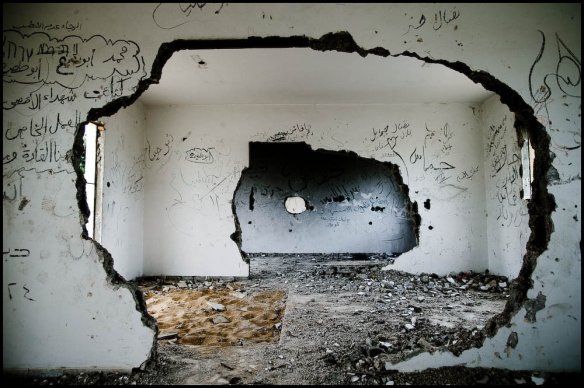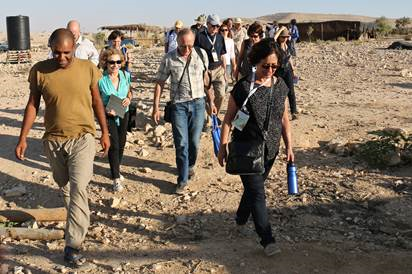Academia has become its own battleground in the Israel-Palestine conflict.

The segregation of research on the Israel-Palestine conflict – or “research apartheid” – reinforces the parties’ reciprocal lack of understanding. Photo: Zoriah @ Flickr
As a scholar of the Israel-Palestine conflict, I usually leave the Ben Gurion Airport with vivid images of checkpoints, separation barriers, demolished houses, crammed refugee camps, poverty, settlements, and soldiers. Earlier this summer, before the war broke out in Gaza, I visited Israel for the first time without entering either the West Bank or East Jerusalem. Without directly witnessing the occupation, Israel appears as a different country. The Palestinian experience of the country is nowhere to be seen, whereas celebration of diversity and tolerance is everywhere. This is Israel as most of its Jewish inhabitants know it. If they hear the notion “Israeli apartheid”, they believe it is a foreign conspiracy against them. With the Palestinians out of the picture, it seems like Israel’s biggest conflict is domestic and centers on what it should mean to be a Jewish state.
I was in Israel to participate on an academic conference organized by the Association for Israel Studies (AIS). My own presentation dealt with how the recent round of peace negotiations suffered from political anomie: Because the Israeli and Palestinian narratives of the conflict are so fundamentally different, the parties are unable to find shared norms to base the peace negotiations on. Palestinians view the conflict primarily in terms of what they regard as an illegal occupation, which in their view must be resolved by an Israeli withdrawal. Israelis, on the other hand, see the conflict as a struggle for recognition, which needs to be resolved before they can end the occupation.
Even when the two sides are discussing the same basic facts, they argue on the basis of different paradigms. While Israel talks about security, the Palestinians talk about universal rights. The only thing they have in common is that both sides understand the conflict, according to their own narratives, as a battle for their own existence.
After having studied the peace negotiations from both parties’ perspectives, I feel lucky not to be in their shoes. While the international society is threatening with sanctions to pressure the parties to negotiate, the negotiators’ situation resembles a Kafkaesque nightmare. Without stable and predictable norms it is impossible to predict the outcome of your own choices, and the other side’s demands appear completely irrational.

Researchers at the AIS conference, gathering for an outing. Photo: Ben-Gurion University of the Negev
The most interesting thing about the AIS conference was to witness how clearly the research on the Israel-Palestine conflict divides itself in accordance with the same logic as the parties’ narratives. Different research paradigms are formed on the basis of either Israeli security concerns or Palestinian rights, without taking into account the opposing party’s concerns. This tendency is reflected just as strongly in dry statistics as in heated political debates.
For instance, both sides use opinion polls to measure the likelihood of a peaceful solution, in which they ask questions that reflect their own narratives. In recent years, many Israelis have become convinced that the main obstacle to peace is that the Palestinians do not recognize Israel as a Jewish state. Even though Israelis themselves are deeply divided as to what a Jewish state is and should be, there is an almost complete consensus that Palestinian recognition of such a state is essential to national security.
Many Israelis fear that Palestinians are not satisfied with a two-state solution, but aim to either undermine the Jewish majority with Palestinian refugees or seize control over the whole territory once the military occupation ends. A common question in Israeli opinion surveys among Palestinians is therefore “Do you recognize Israel as a Jewish state?” The answers are interpreted as indicating the extent to which Palestinians actually want – or do not want – peace.
The problem is that this question is completely disconnected from the Palestinian perception of the conflict. Many Palestinians view this question as if they are demanded to accept ethnic cleansing; systematic discrimination against Arabs in Israel; and the annulment – without negotiations – of the Palestinian refugees’ right of return. For them, the Israeli demand for a Palestinian recognition of Israel as a Jewish state thus asks them to simply accept their core grievances in the conflict without receiving anything in return. Whether or not this is a realistic interpretation of the question is actually unclear, as even the Israeli government fails to agree on in its implications. In either case, Israeli opinion polls say more about what issues Israelis view as important than the extent to which Palestinians want peace with Israel.
Unfortunately it is the norm rather than the exception that research on the Israel-Palestine conflict only examines one side of the equation. Academia has become its own battleground in the conflict. As I learned on the conference, one of the reasons why “Israel Studies” exists in the first place is that many university departments of Middle Eastern Studies are so polarized on the topic that competition for research funding leads to deep conflicts. Journals also often align themselves clearly with one of the perspectives, and research that cuts across the established paradigms can struggle to get published.
The segregation of research on the Israel-Palestine conflict – or “research apartheid” – reinforces the parties’ reciprocal lack of understanding. As long as the parties fail to see each other, hear each other, and share a common discourse to talk about the conflict, there is little hope of finding a solution together.
Anja Sletteland is a PhD candidate in Human Geography at the University of Oslo and a visiting fellow at PRIO. A Norwegian version of this text was published in Dagens næringsliv on July 7, 2014.
Translation from Norwegian: Fidotext
It would be interesting to investigate to what extent children who share educational/curriculum experiences with children from the ‘other side’ are able to construct a ‘shared’ or ‘amalgamated’ or ‘overarching’ paradigm for their conceptualisation of the issues.